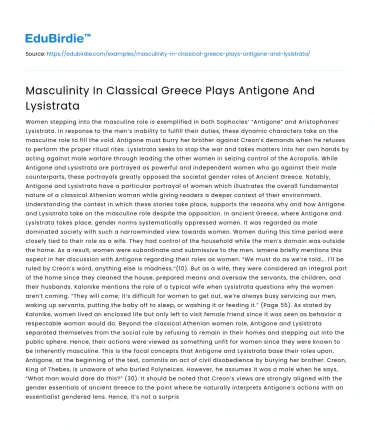Women stepping into the masculine role is exemplified in both Sophocles’ “Antigone” and Aristophanes’ Lysistrata. In response to the men’s inability to fulfill their duties, these dynamic characters take on the masculine role to fill the void. Antigone must burry her brother against Creon’s demands when he refuses to perform the proper ritual rites. Lysistrata seeks to stop the war and takes matters into her own hands by acting against male warfare through leading the other women in seizing control of the Acropolis. While Antigone and Lysistrata are portrayed as powerful and independent women who go against their male counterparts, these portrayals greatly opposed the societal gender roles of Ancient Greece. Notably, Antigone and Lysistrata have a particular portrayal of women which illustrates the overall fundamental nature of a classical Athenian woman while giving readers a deeper context of their environment. Understanding the context in which these stories take place, supports the reasons why and how Antigone and Lysistrata take on the masculine role despite the opposition.
In ancient Greece, where Antigone and Lysistrata takes place, gender norms systematically oppressed women. It was regarded as male dominated society with such a narrowminded view towards women. Women during this time period were closely tied to their role as a wife. They had control of the household while the men’s domain was outside the home. As a result, women were subordinate and submissive to the men. Ismene briefly mentions this aspect in her discussion with Antigone regarding their roles as women. “We must do as we’re told…. I’ll be ruled by Creon’s word, anything else is madness.”(10). But as a wife, they were considered an integral part of the home since they cleaned the house, prepared means and oversaw the servants, the children, and their husbands. Kalonike mentions the role of a typical wife when Lysistrata questions why the women aren’t coming. “They will come; it’s difficult for women to get out, we’re always busy servicing our men, waking up servants, putting the baby off to sleep, or washing it or feeding it.” (Page 55). As stated by Kalonike, women lived an enclosed life but only left to visit female friend since it was seen as behavior a respectable woman would do.
Save your time!
We can take care of your essay
- Proper editing and formatting
- Free revision, title page, and bibliography
- Flexible prices and money-back guarantee
Beyond the classical Athenian women role, Antigone and Lysistrata separated themselves from the social rule by refusing to remain in their homes and stepping out into the public sphere. Hence, their actions were viewed as something unfit for women since they were known to be inherently masculine. This is the focal concepts that Antigone and Lysistrata base their roles upon. Antigone, at the beginning of the text, commits an act of civil disobedience by burying her brother. Creon, King of Thebes, is unaware of who buried Polyneices. However, he assumes it was a male when he says, “What man would dare do this?” (30). It should be noted that Creon’s views are strongly aligned with the gender essentials of ancient Greece to the point where he naturally interprets Antigone’s actions with an essentialist gendered lens. Hence, it’s not a surprise that he would assume a male would commit such a crime. Alternatively, in Lysistrata, when the women seize control of the Acropolis, the Chorus of Old Men find it outrageous that they would commit such an act of civil disobedience. “Who would have ever thought the women, wicked cows we feed at home, would seize the sacred image, occupy my citadel, and bare the gates against us? (64)”.
Understanding the roles of women during Ancient Greece highlights the extremity of Antigone’s and Lysistrata’s actions. It also shows how these characters redefined the role of women. Antigone buries Polynices for two reasons: family loyalty and religious beliefs. It’s clear that Antigone is very focused on family loyalty and seeks to bury her brother’s body against Creon’s orders. While her actions are rebellious, it’s portrayed positively due to its devout nature and the fact that it shows loyalty to the male family members. Going back to the role of women, this closely aligns to the views of Classical Athenian women. As explained earlier, family is an important aspect in the role of women. Antigone has grown up with this mindset therefore, leaving her brother unburried would go against her beliefs. She so consumed with the idea of family loyaltay that she even accepts death as a consequence knowing that “the gods will be proud of me” (11). Her actions are also shown in relation to the family members who have opposed her decisions, specifically Creon and Ismene. This does not stop her, rather, it gives her a way of challenging Ismene to prove herself. “Are we sister, sister, brother? Or traitor, coward, coward? (8)”
As for the other reason why Antigone rebels against Creon’s demands is based on her religious beliefs. Burial rites are extremely important religiously hence, not giving someone a proper burial is seen as very disrespectful. This can be intrepreted in the section where Antigone mentions that “No mourning, and the corpse is to be publicy dishonored….” (pg7). Within a family, it’s the male members’ respoisnbilty to give the deceased a proper burial. Since Creon, the nearest family member, regused to burry his newphew, Antigone sees this as her duty to complete the burial to show her family loyalty. As a result of Creon’s refusual to complete his own duties as a family member, Antigone is forced to take on the male roles in order to fufill the void left by her uncle even if it means overstepping the gender boundaries.






 Stuck on your essay?
Stuck on your essay?

